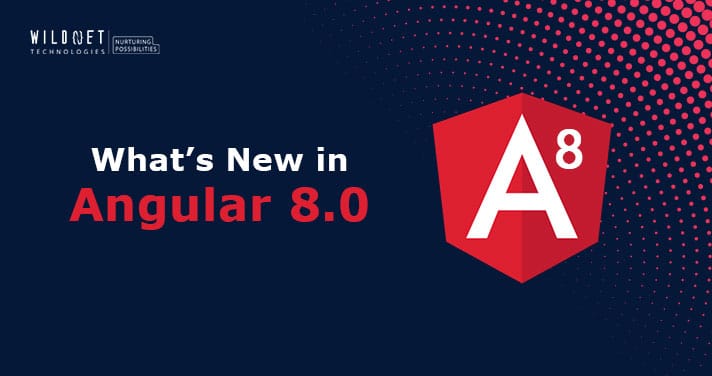What’s new in Angular 8?
When the first version of Angular was introduced back in 2009, nobody had anticipated it would earn incredible popularity like it is with Angular 8.
The framework didn’t do very well then, majorly because of the complex debugging procedure, large bundle size, performance constraints, dependency injection mechanism stopping postcode minification, and various technical problems.
Since that unstable release and to be able to become what it takes to stand out of the rest, Google has worked tremendously on Angular.
Introducing features such as lazy loading, ngupgrade, and web workers (all available in its latest version) to adding new libraries such as Prime NG, NGX Bootstrap, OnsenUI etc. have made Google’s popular framework in-demand more than ever.
Every release of this frontend JavaScript framework Angular renders it more stable than it is in its previous version. Able to handle all challenges proactively, the new version of the platform demands all its users to embrace the change of acquiring the new features and removing the obsolete ones.
Angular has been evolving since its first release almost a decade ago. And the very “cutting-edge application development platform” is improving itself time and again to further strengthen the entire web ecosystem and meet customer expectations.
The new Angular 8 is here!!
The new Angular V8 is nowhere with an impressive list of changes and improvements including the much-anticipated Ivy compiler as an opt-in feature!
Angular in its latest release Angular 8 has now become faster, simpler, and smaller. Building web and mobile applications will be a new experience altogether.
TypeScript 3.4
Angular 8.0 now supports TypeScript 3.4, and even requires it, so you’ll need to upgrade.
And here is more about the Angular 8 features for software developers –
1. New Angular features Differential Loading – Due to Modern JS’s Differential Loading feature, Angular will function above the expectations. This feature lets your app’s users get exactly the JavaScript bundle that fits their particular device or browser.
The new applications CLI creates will have two bundles i.e. modern JS and legacy JS.
The browser will automatically know the correct bundle to make a call action. The browser will then download highly efficient and small bundles for faster loading.
2. It is Ivy, the major change we’re talking about – TL;DR: Ivy is the new compiler/runtime of Angular. Angular 8 Ivy uses incremental DOM where it takes a set of instructions (by creating DOM trees) to compile every single component.
Angular 8.0 is the first release to officially enable developers a switch to opt-in into Ivy.
Ivy basically reworks on compiler and runtime code to have better compatible build sizes, build times, and benefit from new features such as component lazy loading, etc.
IVY mainly supports –
Tree shakable – To speed up the results and load times, tree shakable removes only the unused instructions (and never to be used). When a component does not reference an instruction that has been unused, it is selected for the omission.
Low Memory Footprint – Memory allocation takes place only when the new nodes are added or omitted.
3. Lazy Loading – The feature is based on Angular Routing and it reduces the file size by lazy loading only the required files. The editor will also have the capability to spot any mistake in the syntax to be corrected by the developer.
4. Router Backwards Compatibility – The new Angular 8 now features backward compatibility to the router for improving the path to larger applications. It will then entail less hassle to migrate to Angular. This means that the upgrade of Angular 1.x apps to Angular 2+ will take no time.
5. Builders API – Angular 8 features Builders API for performing operations such as Serve, Build, Test, Lint, E2e
6. Opt-in Usage Sharing – Another feature aligning with the needs of development is collecting used commands and speed of the build. Opt-in usage sharing gives developers the opportunity to make improvements in their project endeavours in future.
7. Web worker – Web workers are great for speeding up tasks when you start working on CPU-intensive tasks. They let you offload work to a background thread, which can be an image or video manipulation.
When the production bundles are created, essential for increased parallelizability and high performance, then web workers are included. Angular 8 offers its building support to CLI that has one bundle for each web worker.
8. Bazel Support–Did you know Angular 8 framework is built using Bazel? It now allows building CLI application using Bazel for the following advantages –
- With one tool developers will be able to create both the frontend and the backend.
- Bazel aims to offer faster concurrent builds an added benefit if the application has a number of libraries and modules.
- Create and deploy only the changes rather than the entire application
- Bazel files are by default hidden and developers can eject it
- Bazel allows remote build containing cache.
There are more like Angular Forms – MarkAllAsTouched, Location, Service worker – Registration strategy, ngupgrade and much more for developers.
Wildnet’s expertise in Angular 8.0
Angular and its developments in years certainly have made a remarkable impact on application development. The leading-edge organizations such as ours are always on the lookout of new features to improve the quality of product-offering. Development with the latest Angular8.0 version is more fun and less hassle.
With a rock-solid foundation of expert professionals, we guarantee application development to be not only swift but promise a high quality and exemplary product. We are keen to give our clients the benefits of extending the component used to modern technology.
To know more about this and the other services we have expertise in, Say Hello Angular8 to us!
Need help ! Contact Us

